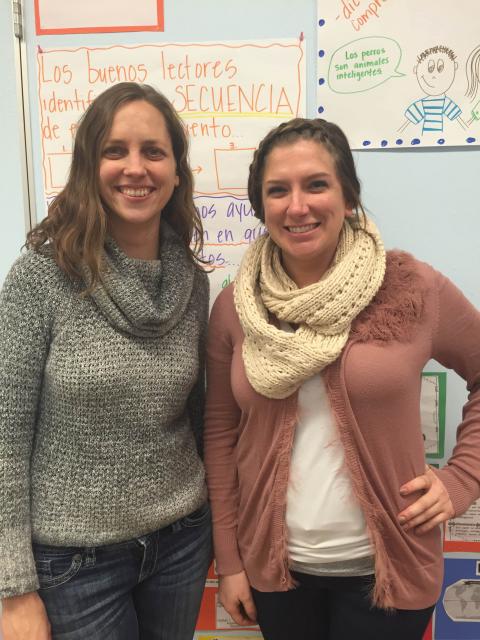






What did you learn in school today?
It’s a common conversation-starter parents ask their children on the drive home or at the dinner table. Second grade teacher Erin Beyer said the common response is usually “stuff,” and that’s where the conversation ends.
To help parents get a better sense of what their student is learning, teachers at Leopold Elementary School have implemented several programs including the newest: an updated format for parent-teacher conferences.
The program called “Madison Parent Teacher Teams” is being piloted in several of Leopold’s second grade classrooms. It supplements traditional one-on-one parent-teacher conferences with two 75-minute group meetings. In these group meetings, parents meet with teachers and other parents in their child’s grade level to assess progress and learn ways to support their child’s academic development.
“At the first group meeting, I got a lot of positive feedback that it was really nice to talk with families they wouldn’t have otherwise communicated with,” Beyer said. “Another thing families really liked is having [specific materials] to take home to work on with their child."
Parents are given materials like dice, a deck of cards, dry-erase boards, markers and laminated games that can be used at home to practice math skills. The MPTT group meetings teach parents how to play these games and how to customize them for their child’s ability level. Teachers also hand out packets that explain how parents can work on certain skills with their child, from sequencing to reading behaviors.

“I used to cram everything I did in these 75-minute group meetings into 15 minutes,” second grade teacher Toni Kaiser said. “I used to tell parents what their child is doing academically and behaviorally and what they can do to help at home. That just doesn’t fit into 15 minutes, and it’s much less daunting to be able to tell all [of the parents] this information at once.”
The MPTT group meetings track students’ academic progress and allow parents to compare their child’s performance to those of their peers, through data sets that assign each student an identification number.
At the beginning of the year, parents and teachers create S.M.A.R.T goals - an objective that is specific, measurable, attainable, realistic and has a time frame. For instance, a parent might set a goal to read with their child for 20 minutes every night in order to improve his or her reading and comprehension skills.
“All these things parents would normally do at home with their student, like counting on their fingers, they’re learning maybe it’s not appropriate or there’s a better way to do it,” Kaiser said. “So we’re helping them understand what we’re trying to teach, why we do it, and how they can help support that.”
The MPTT model still allows parents to meet one-on-one with their child’s teacher when they have specific concerns. The first individual sessions were held after Leopold released its January report cards so parents could address any concerns in a personal, one-on-one setting.
“MPTT really shows the growth throughout the year for individual children,” Beyer said. The group sessions give parents more checkpoints throughout the year for assessing their child’s progress than they would get from standardized testing.
“It’s important to understand that standardized tests are used to identify certain academic trends over time and to find gaps between subgroups of students,” Beyer said. “It’s just one snapshot, and you’re not really going to use that to guide our instruction or narrow in on certain skills.”
At a Parent Faculty Organization meeting in February, one parent raised concerns with the lack of feedback about their child’s writing level and progress. Kaiser and Beyer are working to create a solution to this problem in the form of a two-part assessment: a dictated sentence to indicate spelling and grammar abilities and a writing prompt that would determine a student’s ability to communicate their original ideas using proper writing conventions.
Beyer said another comment she received was a desire for the group session to be more interactive instead of sitting and listening. “It’s a lot of information to take in,” she said.
“It will take a few generations to adjust to this model because our parents and their parents went to one-on-one parent-teacher conferences,” Kaiser said. “Change is hard no matter what it is, but we need to recognize the need for ‘it takes a village.’”
Kaiser explained the responsibility cannot be placed entirely on teachers or parents – it’s a combined effort. After factoring in weekends, early releases and holiday breaks, students only spend about 12 percent of their life in school during second grade. But parents can’t be expected to do all the teaching when they also have to work, cook and transport their child to extra curricular activities.
Research shows home life is the most important factor in determining a student’s academic success. The MPTT pilot program for second graders at Leopold helps parents create a home environment that is conducive to that success.
“[The MPTT model] brings in a sense of community - we’re all working on this together and trying to hold each other accountable,” Beyer said.
|
|
|
Welcome to the Madison Commons, a website designed to provide news and information about all of Madison's neighborhoods and a crossroads for the discussion of community issues. The name comes from the idea of a village commons, a place for news, talk, debate, and some entertainment, too, that's open to everyone.
All rights reserved. Read more about the Madison Commons and its partners.

